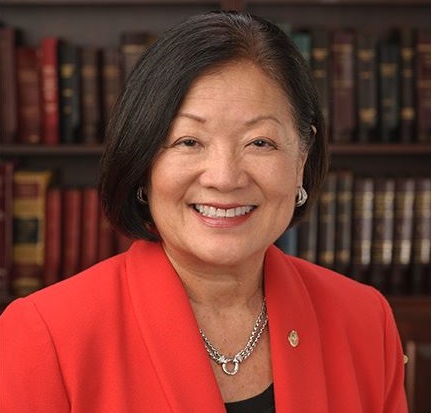1/29/20
WASHINGTON, D.C. – Senator Mazie K. Hirono (D-Hawaii) and more than 150 Congressional Democrats called on the Trump Administration to extend the deadline for public comment on a proposed weakening of environmental regulations.
The letter urges the White House’s Council on Environmental Quality (CEQ) to extend the comment period on proposed changes to the National Environmental Policy Act (NEPA). Over the last five decades, NEPA has set rules for environmental impact assessments conducted by federal government agencies regarding actions that the federal government proposes to fund, execute, or permit. This process ensures that potential negative consequences to the environment due to proposed federal activities are considered, and that input from the affected communities are considered before final approval.
The Trump Administration proposes significant changes like removing the requirement that cumulative impacts be assessed, which removes the consideration of climate change impacts. The proposed rule makes a series of other changes that would significantly harm the environment and open the door to corporate influence.
These dramatic changes, if finalized, will result in one of the biggest overhauls of NEPA in its history, and is yet another example of the Trump Administration favoring special interests over the environment and public health.
“We urge you to extend the comment period to a duration commensurate with the scope and gravity of changes that CEQ proposes,” the lawmakers wrote. “Given that this is an unprecedented rewrite of the existing regulations and will impact proposed federal agency decisions for years to come, any public comment period less than six months would be unreasonable.”
“The sweep of changes proposed in this rulemaking necessitates a long conversation about the proposed rule and the best way forward, if there is any, given the weaknesses in the rulemaking process and policy considered to date,” the lawmakers continued.
A signed PDF of the letter can be downloaded here. The full text of the letter is below:
The Honorable Mary B. Nuemayr
Chairman
The Council on Environmental Quality
730 Jackson Place, NW
Washington, DC 20506
Dear Ms. Neumayr:
We write to request an extension of the comment period associated with the Council on Environmental Quality’s (CEQ) proposed rule to fundamentally re-write the National Environmental Policy Act (NEPA) regulations.
NEPA was passed by an overwhelming bipartisan majority in Congress and signed into law by President Nixon on January 1, 1970. The actual law requires government agencies to engage in a review and decision-making process designed to identify and publicly disclose any significant environmental, social, economic, or public health impacts a federal action may have. Although the NEPA legislative text is brief, the impacts are broad, affecting everything from transportation, water, and energy infrastructure decisions, to habitat and ecosystem conservation, to pollution prevention, and more.
Changes to such an all-encompassing policy must be carefully considered by all parties who will be affected by them, including disadvantaged and tribal communities. At its core, the NEPA process is truly democratic by requiring that the public have a role in federal decision-making. NEPA ensures equitable outcomes by ensuring an equitable decision-making process.
The administration’s proposed rule raises a number of concerns, particularly the guidance to federal agencies to no longer consider the impacts of climate change when developing and planning federal infrastructure projects. When tackling new and critical projects across the country, we need to consider the impacts to our environment. Pretending as if climate change doesn’t play a role in long-term impacts is reckless and costly. Not only is removing these requirements a bad idea for public health and our environment, but it will end up costing taxpayers more when projects aren’t built to be resilient. Removing the requirements also disregards decades of legal precedent. The courts have been crystal clear that NEPA requires the consideration of climate impacts. The proposed rule ignores these clear legal obligations.
During your confirmation process in the Senate, you committed to supporting “efforts to prepare and plan for extreme weather events.” Excluding the impacts of climate change from consideration during the development of projects flies in the face of that commitment. You also promised to “pursue a process that is commensurate with the scope of the rulemaking.” This is a failure to reach the commitments you made.
We urge you to extend the comment period to a duration commensurate with the scope and gravity of changes that CEQ proposes. Given that this is an unprecedented re-write of the existing regulations and will impact proposed federal agency decisions for years to come, any public comment period less than six months would be unreasonable.
Additionally, the number of public meetings your proposal includes is insufficient. Given the extraordinary breadth of the potential impacts to everyday Americans, every effort should be made to provide sufficient time to understand its impacts, and to comment on its merits. This will allow everyday Americans to consider the proposal and its implications on their health, lives, and livelihoods in a public forum, and provide the feedback you seek.
While the regulations finalized in 1978 established a baseline of public outreach with 3 days of public hearings in April 1977, CEQ also organized a NEPA hearing questionnaire pursuant to those hearings that was sent to all witnesses, State governors, Federal agencies, and members of the public who responded to an invitation in the Federal Register. We should do more, not less, given what we now know about how our activities impact the human environment. That is why we urge you to hold, at a minimum, five face-to-face public meetings throughout the country.
Revisions to NEPA should also seek common ground, as the only other comprehensive set of proposed regulations achieved in 1978. As opposed to moderate substantive changes proposed then, the sweep of changes proposed in this rulemaking necessitates a long conversation about the proposed rule and the best way forward, if there is any, given the weaknesses in the rulemaking process and policy considered to date.
We would appreciate hearing from you by February 10, 2020 on your intentions regarding this request.
Sincerely,
###
